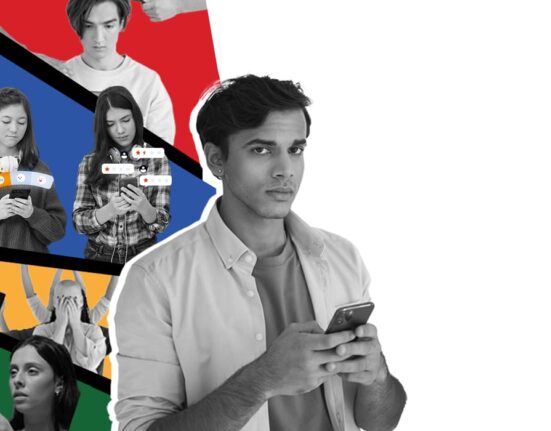You know that moment. In the middle of the night, when browsing through your phone. Maybe procrastinating. Maybe just numb (Dhir et al., 2021). Then there it is: another notification. Another polished victory. Your friend’s “humbled” LinkedIn post about a promotion. A story on Instagram shows a person drinking matcha while their side business subtly generates six figures. A teenager using TikTok casually launches a million-dollar app in between classes. It’s everywhere, this glittering parade of made it.
And right there, in the blue glow of your screen, something twists in your gut (Hunt et al., 2018). That whisper: “How do they all know the script?” As if everyone got some hidden manual for adulthood, some cheat code for confidence, while you’re still fumbling through the tutorial level.
That ache? That cold sweat down your spine when you achieve something good, but all you can think is, “Soon they’ll find out I guessed half the answers.” That is the digital heartbeat of imposter syndrome. It is not just doubting your skills. It’s feeling like a glitch in a system where everyone else seems… effortlessly real (Nesi & Prinstein, 2015).
Amplification of Inadequacy
Digital natives face an unprecedented cocktail of pressure. Social media sites are like carefully edited highlight reels. Struggles, setbacks, and the mundane reality of progress are largely invisible, replaced by polished final products and peak moments. This fuels “compare and despair” syndrome – the tendency to measure one’s raw, behind-the-scenes reality against others’ highly crafted public personas (Primack et al., 2017).
“The curated perfection is relentless,” explains Priya Sharma, a 24-year-old software developer. “I see coding prodigies on Twitter sharing elegant projects and think, ‘I could never do that.’ I forget they aren’t posting the weeks spent debugging or the tutorials consumed. We only see the triumph, never the trenches.”
Compounding this is the algorithmic distortion of reality. Platforms prioritise engagement, not balanced perspectives. Content showcasing spectacular, often youthful, achievements (or dramatic failures) goes viral. The steady, incremental progress that defines most careers rarely garners the same attention, creating a warped perception of “normal” success (Marder et al., 2024). Seeing constant viral breakthroughs makes methodical advancement feel inadequate.
Read More: The Psychology Behind Internet Virality
The Paradox of Accessibility and the Burden of Potential
Never before have the tools for success been so accessible. Online courses, tutorials, open source communities, and global marketplaces democratize learning and entrepreneurship. Yet, this very accessibility imposes a unique psychological burden. When success seems perpetually within everyone’s grasp, setbacks feel intensely personal, and achievements can feel less earned, easily attributed to luck or the tools rather than genuine skill.

This generation matured amidst narratives proclaiming anyone can be an influencer, launch a side hustle, or build a world-changing app. While empowering, this breeds immense pressure to constantly achieve, optimise, and create. The underlying fear morphs: it’s not merely incompetence they dread, but ordinariness in a world seemingly celebrating only the extraordinary.
Read More: When Positivity Becomes a Burden: Understanding Forced Optimism
Remote Realities and the Performance Trap
The shift to remote and hybrid work, accelerated by the pandemic, introduced new dimensions to digital-native imposter syndrome (Holden et al., 2021). The casual feedback loops of office life – hallway chats, overheard conversations, informal mentorship – vanished. Replaced by the formality of scheduled Zoom calls and digital communication, many feel isolated and uncertain about their standing.
“In video meetings, I feel hyper-visible and utterly exposed,” shares Arjun Patel, a 26-year-old marketing coordinator. “I wonder, ‘Do they see through me? Why is this person here?’ The constant self-view on camera, the pressure to perform engagement, and the difficulty reading virtual room dynamics massively heighten self-consciousness and performance anxiety.” Every interaction becomes a potential stage for exposure.
Performing Expertise and the Pace of Obsolescence
The rise of the creator economy and personal branding blurs professional competence with public performance. Digital natives are often expected not only to excel at their core jobs but also to cultivate online personas, share expertise publicly, and engage with professional communities. This expectation to perform competence amplifies the stakes of imposter syndrome; the fear isn’t just private failure, but public humiliation before peers, potential employers, or thousands of followers.

Simultaneously, the breakneck speed of technological change ensures skills have shorter lifespans. New tools, frameworks, and methodologies emerge constantly. “I feel like I’m on a treadmill just to stay relevant,” admits Kavya Iyer, a 28-year-old UX designer. “Every few months, there’s something new ‘everyone’ is using. It’s exhausting and makes me question if I truly know my craft or am just adept at Googling solutions.” The goalposts of competence are perpetually moving.
Read More: How to Deal with Imposter Syndrome
Strategies for Resilience in the Digital Age
Overcoming imposter syndrome in this context demands a fundamental redefinition of success and competence. Mental health professionals and career coaches advocate these evidence-based strategies:
- Curate Your Digital Diet Intentionally: Actively unfollow accounts that consistently trigger unhealthy comparison. Seek out creators and communities that showcase the full spectrum of professional experience – struggles, failures, and the messy reality of growth. Algorithms respond to engagement; shape yours consciously.
- Reframe Continuous Learning as Strength: In a landscape defined by rapid change, adaptability and curiosity are paramount skills. Viewing the need to learn as evidence of inadequacy is counterproductive. Embrace “lifelong learning” as a core professional competency, not a weakness.
- Prioritise Authentic Connection Over Scale: Focus on building deep, genuine professional relationships and mentorship over vast, shallow online networks. Peer support groups and honest conversations about shared challenges provide a crucial perspective absent from curated feeds.
- Leverage Documentation for Self-Awareness: Digitally native individuals excel at documentation. Apply this to your growth: maintain a “brag file” or journal tracking problems solved, skills acquired, positive feedback, and milestones achieved. Concrete evidence combats subjective feelings of fraudulence.
- Normalise “Not Knowing”: Cultivate the professional courage to say, “I don’t know that yet, but I’ll find out.” In an information-rich world, the ability to efficiently learn and problem-solve is vastly more valuable than possessing all answers upfront. This is intellectual honesty, not incompetence.
The Path Forward: Leveraging Technology for Healthier Success
The complexity lies in the dual nature of technology: it fuels imposter syndrome yet also offers unprecedented tools for connection and growth. The solution isn’t rejection, but a more sophisticated, conscious engagement. Positively, mental health awareness is significantly higher among younger generations. Online communities dedicated to authentic professional sharing, mental health support, and normalised struggle are emerging as vital counter-narratives to the polished perfection dominating mainstream platforms.
Forward-thinking organisations are also recognising their role. Implementing robust mentorship programs, creating psychologically safe spaces for questions and mistakes, and openly discussing the learning curves inherent in new roles and technologies are crucial steps in mitigating workplace imposter syndrome.
Read More: The Importance of Mental Health Awareness in Society
Redefining Success and Belonging in the Digital Era
The digital generation pioneers new paradigms of work, learning, and success within an unprecedented technological landscape. This pioneering inherently involves navigating uncertainty – fertile ground for imposter syndrome. However, their inherent comfort with technology, openness about mental health, and collaborative instincts position them uniquely to develop novel solutions.
As they shape the future, their approach to managing imposter syndrome will redefine professional identity, competence, and belonging in an increasingly digital world. The challenge, and profound opportunity, lies in harnessing the very technologies that amplify doubt to instead foster supportive, authentic, and psychologically healthy communities of achievement.
References +
Bravata, D. M., Watts, S. A., Keefer, A. L., Madhusudhan, D. K., Taylor, K. T., Clark, D. M., Nelson, R. S., Williamson, R. A., Saha, A. K., Hagg, H. K., Aegesen, K., Merck, D. L., Koenig, C. J., & Boroff, M. (2020). Prevalence, predictors, and treatment of impostor syndrome: A systematic review. Journal of General Internal Medicine, 35(4), 1252-1275. https://doi.org/10.1007/s11606-019-05364-1
Canning, E. A., LaCosse, J., Kroeper, K. M., & Murphy, M. C. (2020). Feeling like an impostor: The effect of perceived classroom competition on the daily psychological experiences of first-generation college students. Social Psychological and Personality Science, 11(5), 647-657. https://doi.org/10.1177/1948550619882032
Dhir, A., Yossatorn, Y., Kaur, P., & Chen, S. (2021). Dark consequences of social media-induced fear of missing out (FoMO): Social media stalking, comparisons, and fatigue. Technological Forecasting and Social Change, 171, 120931. https://doi.org/10.1016/j.techfore.2021.120931
Holden, C. L., Wright, L. E., Herring, A. M., & Sims, P. L. (2021). Imposter syndrome among first-and continuing-generation college students: The roles of perfectionism and stress. Journal of College Student Retention: Research, Theory & Practice, 24(4), 1113-1140. https://doi.org/10.1177/1521025121995914
Hunt, M. G., Marx, R., Lipson, C., & Young, J. (2018). No more FOMO: Limiting social media decreases loneliness and depression. Journal of Social and Clinical Psychology, 37(10), 751-768. https://doi.org/10.1521/jscp.2018.37.10.751
Marder, B., Houghton, D., Joinson, A., Shankar, A., & Bull, S. (2024). Does LinkedIn cause imposter syndrome? An empirical examination of well‐being and consumption‐related effects. Psychology & Marketing, 41(2), 485-503. https://doi.org/10.1002/mar.21879
Nesi, J., & Prinstein, M. J. (2015). Using social media for social comparison and feedback seeking: Gender and popularity moderate associations with depressive symptoms. Journal of Abnormal Child Psychology, 43(8), 1427-1438. https://doi.org/10.1007/s10802-015-0020-0 Primack
B. A., Shensa, A., Sidani, J. E., Whaite, E. O., Lin, L. Y., Rosen, D., Colditz, J. B., Radovic, A., & Miller, E. (2017). Social media use and perceived social isolation among young adults in the U.S. American Journal of Preventive Medicine, 53(1), 1-8. https://doi.org/10.1016/j.amepre.2017.01.010












Leave feedback about this